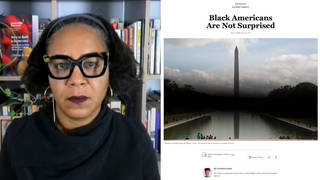
Guests
- Bree Newsome Bassartist, antiracist activist and housing rights advocate in North Carolina.
- Eddie Glaudeauthor and chair of Princeton University’s Department of African American Studies.
As President-elect Joe Biden and his running mate Kamala Harris prepare to take power, we continue to look at the growing debate over the direction of the Democratic Party. House Majority Whip James Clyburn went on several Sunday talk shows to criticize calls to “defund the police” and argued the phrase hurt Democratic congressional candidates. “It is actually insane that we would think the way to respond to the scale of problems that we confront as a nation is to harken back to an older form of politics that … seems to try to triangulate and appeal to this Reagan Democrat that they are so obsessed with,” responds Eddie Glaude, author and chair of Princeton University’s Department of African American Studies. “It makes no sense that we would go back to the politics that produced Trump in the first place.” We also speak to artist and antiracist activist Bree Newsome Bass, who argues Black voters “are scapegoated when it’s convenient, and then we are thrown under the bus when it’s convenient … That’s a dynamic that has to end.”
More from this Interview
- Part 1: The End of Trump? Biden & Harris Claim Victory in Historic Election, Vowing to Heal Divided Nation
- Part 2: Ro Khanna: Progressives Helped Biden Win. We Can’t Stop Push for Green New Deal & Medicare for All
- Part 3: Bree Newsome & Prof. Eddie Glaude: The Black Lives Matter Movement Helped the Democrats Defeat Trump
Transcript
AMY GOODMAN: This is Democracy Now!, democracynow.org, The Quarantine Report. I’m Amy Goodman.
History has been made: President-elect Joe Biden, Vice President-elect Kamala Harris. Kamala Harris set so many precedents here. She becomes the first woman vice president, the first African American vice president, the first Indian American vice president, first South Asian vice president, the first Tamil American vice president, the first Caribbean American vice president, her father from Jamaica.
As we continue our conversation with Eddie Glaude and as well as Bree Newsome Bass, we’re going to turn right now to a comment that is brewing part of the debate that’s happening right now about the direction of the Democratic Party. This is House Majority Whip James Clyburn of South Carolina, who went on several Sunday talk shows to criticize calls to defund the police, arguing the phrase hurts Democratic congressional candidates. Here he is on NBC’s Meet the Press citing the defeat of Jaime Harrison in South Carolina against incumbent Republican Senator Lindsey Graham.
REP. JAMES CLYBURN: Jaime Harrison started to plateau with “defund the police,” showed up with a caption on TV right across his head. That stuff hurt Jaime. And that’s why I spoke out against it a long time ago. I have always said that these headlines can kill a political effort.
AMY GOODMAN: That’s Congressmember Clyburn speaking on the Sunday talk shows. Clyburn is credited with really Joe Biden winning the Democratic primaries, having endorsed him right before the South Carolina primary, which then launched him to victory. I wanted to first go to Bree Newsome Bass. You’re in the Carolinas, but you’re in the other one: You’re in North Carolina. Can you talk about this major debate, this debate for the soul of the Democratic Party right now, Bree?
BREE NEWSOME BASS: Yeah, certainly. Well, I mean, first of all, to this argument that is being made so fiercely right now, you know, attacking the “defund the police” effort, I mean, I have yet to see anyone provide any concrete data that supports that claim, other than people making this conjecture. I mean, I live in the Carolinas. I have seen all of the ads that have been running. I mean, they were also running a lot of ads trying to tie Jaime Harrison to Hillary Clinton and Nancy Pelosi. So, I mean, unless someone is showing data that can really show that one or the other is what led to Jaime Harrison specifically plateauing in South Carolina, which is a deeply red state, you know, was an uphill battle against Lindsey Graham to begin with, I frankly don’t give that a whole lot of weight.
And I think, again, we cannot gloss over the racial aspect of this whole situation. So, we’re talking about a situation where the Democratic leadership is making the claim — simultaneously making the claim that we need to reach across the aisle, we need to engage in bipartisanship with the party that is not acknowledging the election results; the party that just tried to prevent us from having a free and fair election; the party that engaged in rampant voter suppression, disenfranchisement and intimidation, and particularly in communities of color; the party that, you know, is completely opposed to the idea of our existence; the party that is essentially advocating a form of genocide through medical neglect, that has been ravaging our communities. And so, we can’t just gloss over when people are saying that the path forward is to build with Republicans and at the same time to essentially demonize, make a boogeyman of Black activism and Black causes.
Ro Khanna is exactly correct. It is the organizers, the same exact people who have been organizing Black communities around issues that impact us, that mobilized those voters for the Biden-Harris win. You know, I’ve also seen people making reference to progressives as being the ones who are being divisive or, you know, ending the truce within the Democratic Party. And it’s quite the opposite. You had a situation where you have a significant segment of people who either traditionally vote Democrat, a lot of people who are completely disengaged from the electoral process completely because they feel that regardless of who is in power, their needs are not met; regardless of who is in power, the police continue to kill us; regardless of who is in power, we do not have access to proper healthcare, we do not have access to housing. So, you had a lot of organizers who had to do a lot of heavy lifting to convince folks that it was worthwhile simply to get Trump out, to mobilize behind Biden and Harris. And that’s why you got Georgia turning out as it did. That’s why you got Arizona turning out as it did.
So, in my view, for anyone to look at the election results and for the takeaway to be we need to figure out how to appeal to the Lindsey Graham voters, you know, and the deeply red districts, as opposed to recognizing that there’s an entire electorate that is younger, that represents where the electorate is going — it’s younger, it’s more diverse, it can win you states in the South — this is the argument that Stacey Abrams has been making for quite some time — instead of looking at things and saying, “How can we invest more in Black and Indigenous and people of color organizing? How can we really look at those issues?” — this is again going to what Ro Khanna was saying — I mean, politically, that makes a lot more sense than saying, “How do we tap into the electorate that lost the presidential election, the electorate that is shrinking, and then, morally, the electorate that opposes democracy?” because they are more committed to racism than they are to the idea of a democracy that allows everyone to participate. So, you know, again, I just think that we cannot — we cannot gloss over.
Yes, I recognize, of course, that James Clyburn is a long-standing politician from South Carolina. He is Black. And I don’t — you know, I’m sure that he recognizes what the political landscape is like in South Carolina. But if we’re looking at the bigger picture, they’re going to cost themselves the Senate race in Georgia if the case that they’re making is that we’re going to try to lean more towards Republican than making it clear to people that unless they turn folks out for those Senate seats in Georgia, you’re not going to have access to the things that you need, like healthcare and all these other things. So, if they embrace a more centrist or Republican agenda, then the takeaway from folks is going to be, again, that it doesn’t matter whether they turn out to vote or not. So I think it’s just like the complete opposite.
And the fact that the focus in the immediate aftermath of the election, when we are still dealing with the situation of a president who does not acknowledge the election results, we’ve got him stoking violence among white supremacists who are threatening violence against sitting governors, who have threatened to blow up ballot-counting centers, that folks would pick defunding the police as the target, as the threat, as the danger, when you’re talking about communities that are still being killed by police and still turning out to support this party in spite of that, complete opposite direction of where they should be going.
AMY GOODMAN: That brings us to professor Eddie Glaude. Professor, you tweeted this quote from James Baldwin: “It has always seemed much easier to murder than to change. And this is really the choice with which we are confronted now.” Explain.
EDDIE GLAUDE: Well, you know, there’s a sense in which the reckoning that we find ourselves involves the question of whether or not we’re going to fundamentally embrace the idea that we are a multiracial democracy. And the history of the country suggests that we constantly, when faced with that question, will double down on violence, that white America will choose violence to defend its way of life, to defend those noxious assumptions, that have, in some ways, led to the organization of our way of life predicated upon this idea that white people ought to be valued more than others, that they will in fact exact a certain kind of violence to defend that view. And so, Baldwin, in this moment, is kind of marking this, right? That America is always talking about it changing, but it never changes, right?
And so, what’s so interesting about the conversation around the Democratic Party is that it’s actually insane — right? — that we would think that the way to respond to the scale of problems that we confront as a nation is to harken back to an older form of politics that is DLC, “Third Way” Democratic-oriented — you know, Democratic politics, that seems to try to triangulate and appeal to this Reagan Democrat that they are so obsessed with as a way of responding to this problem. It makes no sense that we would go back to the politics that actually produced Trumpism in the first place. That’s the first point. The second — or the second point.
The third point is this: We can’t allow these folk to disentangle Trumpism from the Republican Party. I think this is what Bree Newsome Bass is trying to suggest to us. We can’t allow them to disentangle these two things. They are one and the same. So what are you asking for when you talk about reaching across the aisle? What are you asking us to do when you talk about reaching across the aisle in unity? We won’t do that again. That’s not going to happen this time.
And then, lastly, we need to get beyond, I think, these narrow labels. The politics is much more muddled. Right? We need to get beyond these narrow labels. We need to get beyond big government and small government and smart government and get to transformational government. We need to understand what “defund the police” means. Budget your values. Budget your values. That’s what it means at the heart of it, right? Why are you spending 60, 70% of your municipal budgets on policing, when you have education, social services and the like? Stop lying. Stop lying.
And then what we need to pay attention to, lastly — I’ll say this really quickly — we need to pay attention to who Biden appoints as his secretary of treasury. If we get another Rubinite, if we see someone in that tradition, we know what we got. And so, remember, we celebrate yesterday and the day before, but today begins the hard work. The problems of this nation require us to break from the old frames. And we will not allow Clyburn, we will not allow Kamala Harris’s symbolic and significance, we will not allow the threat of Donald Trump to get us from seeing that that is the issue. We have to break the political frame that got us in this mess in the first place.
AMY GOODMAN: I wanted to ask you, Professor Glaude, Black male voters, a lot is being made of, came out in higher numbers for Trump this time than last time. But my colleague, co-host Juan González did a brilliant analysis of the information that’s come out on who voted in this unprecedentedly high turnout campaign, the highest in absolute history. Now, what it looks like at this point, as he was pointing out, white voters did not increase that much. That meant people of color increased. Yes, there were more people of color who voted for Trump, but overwhelmingly more who voted for Joe Biden and Kamala Harris. Apparently, many people are concerned about — well, I mean, obviously, many people are concerned about how close the election was — Trump winning possibly about, at this point, 57% of the white vote. And you, in your piece in Time magazine, said, “Alongside the details of policy and the particulars of governing a deeply divided country, [Biden] will have to confront what Donald Trump refused to face: that our way of life is broken.” Can you end with that?
EDDIE GLAUDE: Sure. You know, I think we have to deal with the reality of our dead. Close to 240,000 Americans are dead, and there’s no communal, public rituals to acknowledge the collective grief and individual sorrow that we’re experiencing. We have to deal with loneliness and what does it mean for us to be stuck in our homes and hidden behind our masks, where social interactions are kind of overdetermined by the specter of death and the virus. And then, of course, the principal issue is selfishness, that you have folk who have simply given up stake in the American life for their own selfish ends. And so, when we look at those numbers among Black men and Latino men, we can say that, you know, the epidemic of selfishness doesn’t end at the doorstep of white people. And so you have people who are concerned about their 401(k)s, concerned about their own individual self-gain, individual self-interest. And so, these folk have opted out, in some ways, of any robust conception of the public good. So we’re going to have to deal with death, loneliness and selfishness and how it poses, I think, an existential threat to our democratic way of life.
But, you know, everybody is bringing up Black men. When you look at Black folk, when you think about what happened in Atlanta, when you think about what happened in Milwaukee, when you think about what happened in Detroit, when you think about what happened in Philly, you see the path for the Biden-Harris ticket to get to the White House through Black America, Black folk. Black men voted at 80-plus percent. They need to start talking about why white women have voted at 56% for Donald Trump, given what he’s done. But, again, who’s at the center of the gravity of our politics? Who are folks thinking about all the time in a certain sort of way? We need to — these numbers will allow us to drill down at some point, but we need to understand the reality for what it is.
AMY GOODMAN: Last 30 seconds, Bree Newsome Bass.
BREE NEWSOME BASS: Yes. I mean, I think that there is this constant abusive relationship between party politics and Black communities, where we are scapegoated when it’s convenient, and then we are thrown under the bus when it’s convenient. And otherwise, it’s, you know, “Show up to the polls to help us stay in power, because we can’t get elected without you.” And that’s a dynamic that has to end. When it’s time to try to scapegoat and talk about, you know, why did Trump do better, then they want to talk about Black men. When it’s time to talk about the issues and why 80% of Black men turned out to vote for Biden, no one wants to talk about defunding the police. That’s the dynamic that has to end.
And I think the last thing I would say is it’s important for everyone to recognize that the Black movement, the Black organizing of our communities, that is independent of the Democratic Party. We are interacting with party politics, but this movement began during the Obama administration, it continued through the Trump administration, and it will continue through the Biden administration. We’re not altering our agenda based on what the Democratic leadership decides.
AMY GOODMAN: We have to leave it there, and I thank you so much for being with us, Bree Newsome Bass, antiracist activist, and Princeton professor Eddie Glaude.
Happy Birthday to John Hamilton and Kieran Krug-Meadows! I’m Amy Goodman.











Media Options